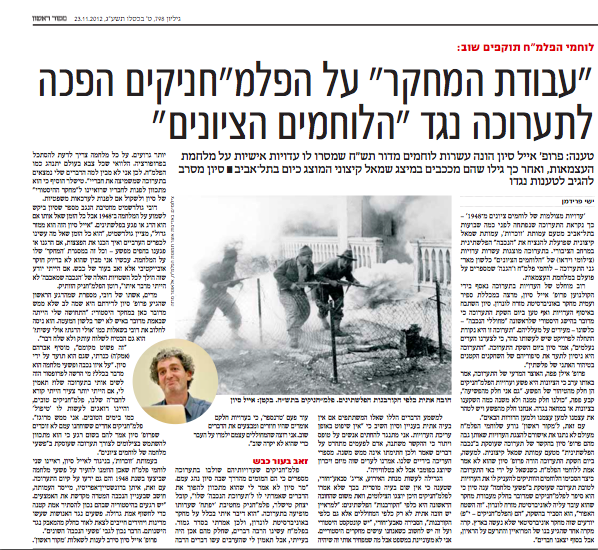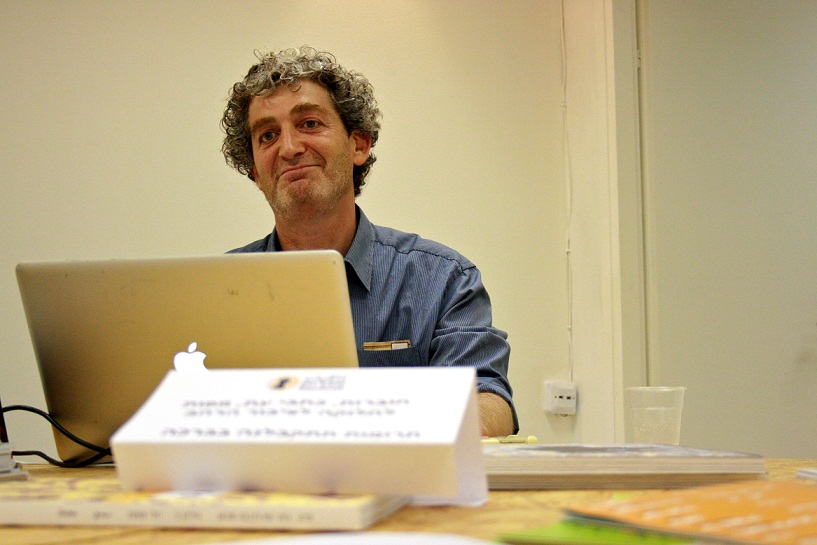"Filmed Testimonies by Zionist Fighters in 1948" is the name of an exhibition opened several weeks ago in Tel Aviv by Zochrot, an extreme leftwing NGO acting to commemorate the Palestinian "Nakba" in public space. The exhibition presents dozens of testimonies (in video format) of "Zionist fighters", as the organizers call them – Palmach and Haganah fighters who tell about their actions in the War of Independence.
The great majority of the testimonies have been collected by filmmaker Prof. Eyal Sivan, a lecturer at Sapir College and a research fellow at East London University. Sivan prided collecting these testimonies and even claimed at the exhibition launching event that this was a historic achievement: for the first time, the "perpetrators of the Nakba", as he called them, "testify about their wrongdoings". "This exhibition is the starting point of a project that must be completed soon, because regrettably the witnesses are disappearing", said Sivan on the opening night. "This exhibition represents an attempt to document the stories of the little players in the ethnic cleansing of Palestine".
Prof. Ilan Pappe, the exhibition's scientific curator, said that night that Zionism is a crime and that the Plamachniks' testimonies are part of the atonement for that crime. "I, too, am part of that crime", said Pappe. "We are all part of it, no matter how invested we were in Zionism or in protesting against it. We are part of the crime and we must purge ourselves for ourselves and for the sake of future generations".
However, it came to Makor Rishon's knowledge that the Palmach fighters have never given their approval for presenting the testimonies collected by Prof. Sivan within the context of an exhibition about the "Palestinian Nakba" organized by an extreme leftwing NGO. In fact, on the opening night Prof. Sivan admitted that he had not told them the truth. When asked by members of the audience how the veterans agreed to testify for an exhibition dealing with "war crimes", Sivan responded that he had told the Palmachniks that this was part of a research project for the University of East London. "This is the gray area", he explained in the launching event. "They [the Palmachniks – YF] know that this is an academic study that is not conducted in Israel. There was one case in which an interviewee's son came and protested the interview. But at the end we became friends".
Upon hearing that, members of the audience asked whether there was no ethical problem here, and Sivan replied that "no judgment was used in the way the testimonies were edited. I'm against having people sign waivers, because the context changes. People are sometimes sorry for things they've said, so their signature doesn't really matter. The editing scissors are in our hands. We told the witnesses this was a memory project that would be presented in public, but not on television".
Arij Sabbagh-Khouri, who hosted the evening, went even further by arguing there was no moral problem in that the Palmachniks had not been told where the films would be displayed, since the first duty was towards "the Palestinian victims": "The interviewer has an ethical duty not only to the perpetrators, but also to the victims", Sabbagh-Khouri explained, "there is a historical context and this is what we need to have in mind when we conduct historical studies. I am not interested in a trial, but what scares me is that there would be another transfer, because in the testimonies some say that they would have done those things again. I want the perpetrators themselves to learn about the past so that it doesn't happen again".
Wolf in Sheep's Clothing
Palmachniks whose testimonies have been included in the exhibition say they are shocked by the way they have been treated by Sivan. "Mr. Sivan never told me he intended to turn the things I'd shared with him into his own 'Nakba exhibition'", protests Yitzhak Tishler, a Palmachnik from Yiftah Brigade whose testimony appears in the exhibition. "What he told me was about this study for the University of London, so I said fine. In the Palmach we did plenty of things, some of which were indeed problematic, but believe me, the Arabs did a lot worse. You should know how to treat every war in the proper perspective. I wish every army in the world would act like the Palmach. Therefore, I do not understand why my stuff is on an exhibition which slanders my friends". Tishler added that he intends to contact his friends interviewed for Sivan's "historical study" and consider taking legal steps.
Dobi Goldshmit of Hanegev Brigade says that Sivan wanted to hear about the 1948 War, but kept asking him if he killed or mistreated any Palestinians. "This Eyal Sivan is a bastard", says Goldshmit. "He kept asking us what we did to the Arab villages and how we prepared the bombs, if we killed or injured any non-combatants – all that as part of his 'research' about the war. Now I realize he is not exactly an objective researcher, but a wolf in sheep's clothing. Had I known this was going to serve all this 'Nakma Shmakba' nonsense, I would never have spoken to him", gripes the veteran Palmachnik.
Miriam, Dobi's wife, says that from the moment Prof. Sivan arrived at their apartment she noticed this was not really a historical study: "I really felt that this was a dishonest person, to say the least. He tried to squeeze Dobi dry by asking him questions like, 'perhaps you killed? Perhaps you did?' He also promised to send us a copy but sent nothing".
"This is simply outrageous", adds Abraham (Make) Kinarti, also documented by Sivan. "What Nakba and war crimes is he talking about, anyway?? Who allowed that professor to put me on his exhibition? Believe me, if I was younger I would have called our boys, good Palmachniks the lot of them, and we would have 'treated' him like in the good old days. I'm really furious".
Other Palmachniks we have spoken to do not recall Prof. Sivan ever telling them that he intended to use the footage for an exhibition on "war crimes by Zionist fighters".
Unlike Eyal Sivan, Zochrot interviewed two Palmach fighters who had actually been invited to testify on war crimes committed in 1948, and who also knew about the exhibition. Nevertheless, Zochrot founder Eitan Bronstein-Aparicio believes that when it comes to the Nakba, the end justifies the means. "There are moments in history when it is appropriate to hide a small truth in order to expose a bigger one. Crimes against humanity committed by nations and individuals must see the light as part of the struggle against their recurrence. This is true of all the various Nakba crimes".
Prof. Eyal Sivan refused to answer Makor Rishon's questions.

כתבה ממקור ראשון / article at Makor Rishon



